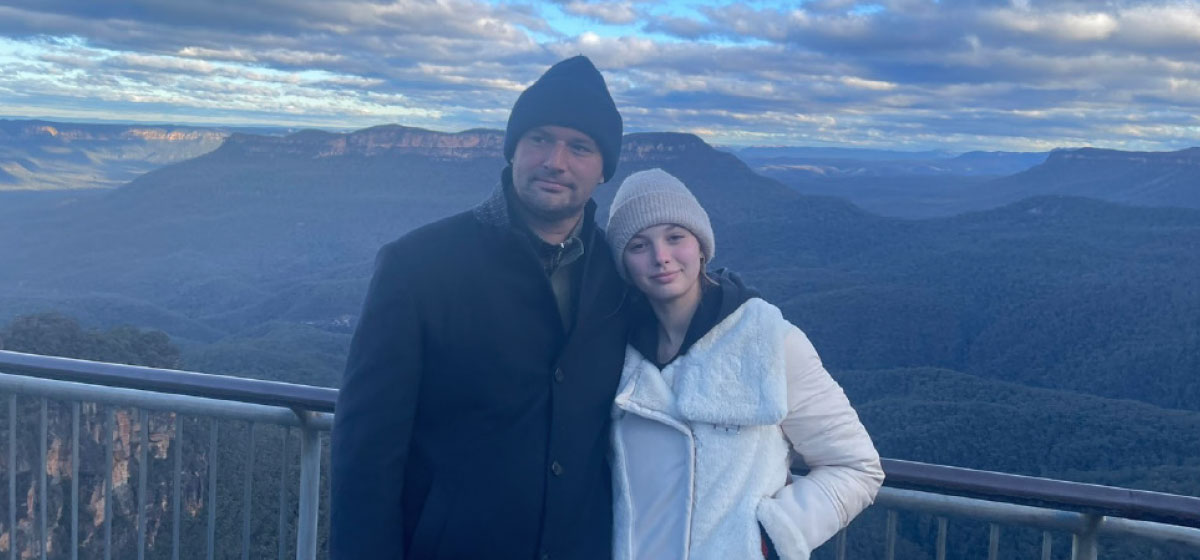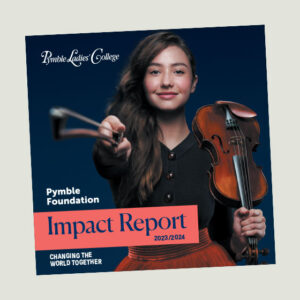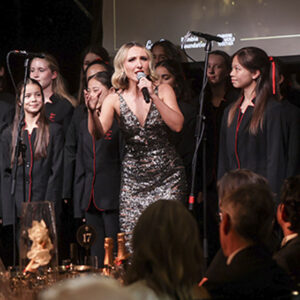From Kharkiv to Pymble: Kseniia’s journey of hope and resilience
May 27, 2025

It was the dead of night – 4.00am to be exact – when air raid sirens began screaming
out across Kharkiv, Ukraine’s second-largest city, located only 30 kilometres from the Russian border, immediately jolting Kseniia Vereshchak and her family awake.
An invasion on her city by the Russian military was imminent; an invasion on the place Kseniia, her friends, family and approximately 1.2 million other Ukrainians called home.
Kseniia vividly recalls her mother, Alyona, rushing inside her bedroom within the family’s seventh-storey apartment and telling her to pack her bags.
“What’s happening? Am I going to school?” Kseniia asked her mum, still not registering exactly what was happening in her half-asleep state.
“No, you’re not going to school,” Alyona replied.
Kseniia and her family relocated to, and lived in, the basement of their apartment building for the next seven days, only leaving on the odd occasion to go to the local store.
The last, and probably darkest, memory Kseniia has of her hometown is carefully venturing outside of her apartment building to take a quick look at what was unfolding, when a bomb flew directly over her head.
That was the final straw. Kseniia, her parents and two younger brothers picked up her grandma in their car and travelled three days non-stop across Ukraine to flee the country.
Little did Kseniia know that the next time she would go to school, it would be 14,520 kilometres away on the other side of the world, in Sydney, Australia.
NEW BEGINNINGS
After a short stay in a small Romanian village, the Vereshchak family had their Temporary Humanitarian Concern visa applications approved by the Australian Government in less than 24 hours. Soon, they were on the move again, flying from Romania to Turkey, then from Turkey to Singapore, and finally from Singapore to Australia.
It was only then that Kseniia and her family could take a moment to breathe, reflect on the trauma they had endured and start planning for their uncertain future.
In what can now only be described as a sliding doors moment, Kseniia’s mum connected with a local woman with Ukrainian roots on Facebook, who said she had a daughter who was a similar age to Kseniia and suggested that the two should hang out.
“I didn’t have any friends at all back then, so we went on a walk and she was talking about her school non-stop,” Vereshchak said.
“She went to an all-girls’ school, which I found a bit weird since they aren’t a thing in Ukraine, and she was telling me all about how nice it was and all the fun activities they did.”
That school was Pymble, and just a few weeks later, after multiple interviews with Principal, Dr Kate Hadwen, Deputy Principal, Ms Lamia Rockwell and Head of Senior School, Mrs Nikki Wyse, Kseniia was accepted into the College.
FINDING HER FEET AS A PYMBLE GIRL
As is usually the case when someone comes to the College for the first time, Kseniia was blown away by what she saw.
“When I first walked through the gates at Pymble, my jaw dropped,” said Vereshchak.
“I’d never seen a school so big; I didn’t even know a school like this existed. And then I saw all the girls in their uniforms and thought to myself, ‘That’s going to be me.’”
Naturally, one of Kseniia’s biggest worries about starting at a new school was fitting in and making friends. This worry was amplified tenfold when, on her first day, she discovered that she’d be going on a three-day camp with her entire year group.
“The idea of spending so much time with complete strangers was intimidating,” Vereshchak said.
“However, that experience ended up being one of the best things that could have happened. The group of people I shared a room with during the camp ended up becoming my closest friends over the next two years.”
Despite never having heard of the subject when she first selected it, Kseniia says Design and Technology quickly became one of her favourites, mostly thanks to the time and effort her teacher, Mr Peter Ellis, invested in not only her learning and development, but also in getting to know her on a personal level.
“When I first came to his class, he asked me my name, and when I told him he said, ‘Wow, Kseniia, that’s an interesting name,’” said Vereshchak. His pronunciation left a lot to be desired.
The very next day, Mr. Ellis once again came up to Kseniia in class and told her, “I was Googling your name the whole night, and I finally know how to say it: it’s ‘Sen-ya!’”
“I was like, ‘Yes! Thank you!’ No one had ever done that for me,” Vereshchak said, her smile beaming from ear to ear.
A BRIGHT FUTURE AWAITS
Now having officially obtained her Higher School Certificate, and most recently finding out that she and her family had been offered a “resolution of status” visa offer – giving them the same rights and benefits as permanent residents – the next chapter of Kseniia’s life will be written by her, and her alone.
Amazingly, Kseniia said in an interview with the College in 2023 that she wanted to one day become a fighter pilot. This is something she’s still passionate about, but for now her plan is to study civil engineering at university in 2025.
“I believe civil engineering offers a balance of creativity and problem solving, which really appeals to me,” said Vereshchak.
“It feels like a great way to make a meaningful impact on the world around me, and I see it as the foundation for a fulfilling career.”
Kseniia still pinches herself about how her whole life has changed in the space of two short years, trading the “snowy slopes of Ukraine for the sandy shores of Australia,” and is still unsure of whether she’ll ever permanently return to the country she once called home.
“The friendships I’ve built, the connections I’ve made and the life my family has created in Australia over the past few years would be incredibly hard to leave behind,” Vershchak said.
“Australia feels like the place where I can continue to grow, both personally and professionally, but I’ll always carry a piece of Ukraine with me wherever I go.”


